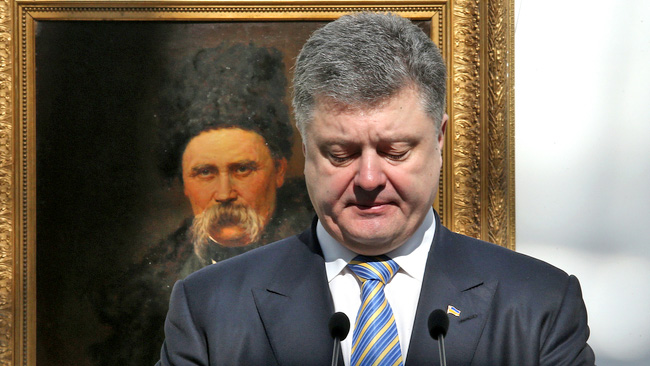A key question without an answer
Petro Poroshenko’s two years as president: a summary
“Are we waging a war or doing business?” This has been the key question of Petro Poroshenko’s two years of presidency.
Poroshenko received an unprecedented support of the voters actually because he managed to convince them: he has a recipe for victory in the war, and the world community supports his “Plan.” And secondly, for many Poroshenko’s promise to sell his business played a decisive role on the polling day.
However, time passed, yet the business would not sell. On the contrary, it flourished, including the factory on the territory of the country which attacked us; three friends sat in offices on Bankova and Hrushevskoho streets, instead of being put behind the bars; the war kept taking its toll and grew into a permanent challenge. People started asking questions.
Back then, in December 2014, journalists brought those questions to the president’s first concluding press conference. By the way, since then open communication has become a rare format for President Poroshenko.
On behalf of Den/The Day I asked at that first press conference: “The world demands clarity: are we waging a war, or are we doing business? Why is the business still not sold? Why is the Roshen Confectionery Corporation increasing its presence in Russia just as we demand that the world stand on our side in the war against the Russian Federation and toughen the sanctions?”
Later, the fragment with our question was even used by the Opposition Bloc in their campaign video on Ukraina TV station. From the president’s reaction it was immediately clear that this question had cut him to the quick. Namely, Poroshenko pretended to be totally unrelated to his confectionery corporation and advised us to seek information directly from Roshen, and then assured us that his sweets “have almost no sales on the Russian market.”
“I would like to advise you to ask Roshen all the questions concerning Roshen. You will get all the answers. My answer would be the following: I do not know about the sales of Roshen on the market in the Russian Federation. But I can assure you that today sales in the Russian Federation are virtually non-existent. The RF banned imports of Roshen’s products as far back as in 2013, and the ban is still in effect. Secondly, billions of rubles were blocked on the accounts of the Russia-based Roshen factory in 2013, which thwarts the operations. This sequestration has not been lifted,” said the president.
Meanwhile, the Roshen figures show that the profit of its Russian factories in 2013 grew by 23 percent on the previous year and reached 2.16 billion rubles, or 7 percent of the Russian market. The investigation authorities of the Russian Federation had dismissed the years-long high-profile criminal case against the confectionery company “as unfounded.” Simultaneously, the sequestration of the company’s accounts was lifted.
The president’s second year in office provided even more eloquent answers to our question: the Panama scandal, the Korban case, the activities of Ihor Kononenko, deputy leader of the president’s faction, the conflict with Prime Minister Yatseniuk, which eventually ended in a political crisis that had to be solved in front of the entire world by buying MPs, and finally, the cherry on the cake: Lutsenko as Prosecutor General. It is not so much a matter of personality (albeit family relations between the prosecutor general and the president smell fishy), as a matter of insolence with which the government trampled the proceedings in order to push through the desirable decision.
Poroshenko showed that he was not going to fight the clan-oligarchic system when he squeezed Kolomoisky and his team from Dnipropetrovsk and Odesa. It sent the second negative message to the volunteer battalions. Whatever you might think of Kolomoisky and Co, it was them who did not let Putin seize Dnipropetrovsk. We do not know for sure all the circumstances of importing the Georgian team to Ukraine. But one thing is obvious: the Georgians were employed to squeeze Kolomoisky’s people from Odesa.
So the bottom line is this: having an opportunity to dismantle the clan-oligarchic system, which had weakened Ukraine and brought us to war, and against which the first and second Maidan had revolted, Poroshenko opted for a convenient (in his opinion) role of the guarantor of its preservation, thus effectively having himself bound hand and foot.
After all, out of all questions the president is barraged with, one essential question remains, and he has to do some good constructive thinking to answer it: when he loses the last remaining sympathies of his own people, where and from whom is he going to look for support? Den once (November 5, 2010) wrote an article under the headline “Who Will Protect the President?”
Newspaper output №:
№33, (2016)Section
Economy





